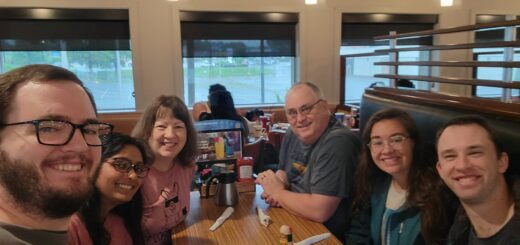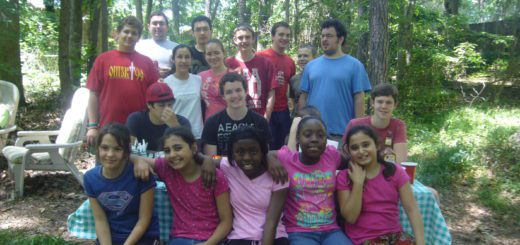It’s All About Blessing

“It’s All About Blessing” – November 24th, 2024 (Psalm 134)
Psalm 134 (NRSV) – “1 Come, bless the Lord, all you servants of the Lord, who stand by night in the house of the Lord! 2 Lift up your hands to the holy place, and bless the Lord. 3 May the Lord, maker of heaven and earth, bless you from Zion.”
We come now to the very last psalm in our series of Pilgrimage Psalms. It turns out that this psalm is all about blessing. So, today we are going to talk about blessing, and then we’re going to do some blessing!
In looking closely at any Bible passage, it’s good to pay attention to repeated words. Since the Hebrew root, barak, occurs three times, once in each verse, we are going to start by examining this more closely. It turns out that the verb barak primarily means “to bless.”
Today this word is, for some, associated with a confessional (“Bless me, for I have sinned”). It is perhaps most often used in more casual settings, at least in our part of the world:
- at mealtimes (“Let’s bless the food”),
- after a sneeze (“Bless you!”),
- to express surprise (“Well, bless my soul!”),
- to tell someone off (“I blessed them out”),
- to offer genuine sympathy (“Bless your heart!”),
- or, by altering the tone to convey condescension, derision, or contempt (“Bless your heart!”).
There was nothing casual about blessing in the ancient Hebrew world. Blessing was at the very heart of family, community, and worship.
Psalm 134 invites us to participate in blessing in three specific ways.
The first of the three ways in which we participate in blessing is that God blesses us.
Psalm 134 is a call to receive God’s blessing.
Even though it is in the third and last verse of this Psalm that speaks of God blessing us, receiving God’s blessing must be the first way in which we participate in blessing. We cannot give that which have not received. God loves us first, enabling us to respond in love towards God and people. God blesses us first, enabling us to respond in blessing towards God and people.
Let’s again read the third verse of Psalm 134 – “May the Lord, maker of heaven and earth, bless you from Zion.”
If these words sound familiar, it might be because if we turn left in our Bibles or our Bible apps, there is a similar blessing in Psalm 128:5a: “The Lord bless you from Zion.” The blessings from both of these Psalms point back to what is known as the “priestly blessing” in the book of Numbers. In spite of its mathematical-sounding name, that book of the Bible is not about counting. The book of Numbers is about the journey of God’s people through the wilderness to the edge of the promised land. The book is much more accurately described by its Hebrew name: “In the Wilderness.” We who follow Christ are God’s people journeying on the way of love, both in times and places of wonder and in times and places of wilderness. The wilderness is a biblical term for a place characterized by barrenness, danger, desolation, isolation, wandering, trials, and testing. Yet it is also a place where God meets us. Psalm 34:18 assures us that “the Lord is near to the brokenhearted, and saves the crushed in spirit.” Perhaps especially in times and places of wilderness, we encounter God; we learn to rely on God; and, as we surrender to God, we undergo transformation.
All throughout the history of God’s story with God’s people, the place where worship is given to the Lord is also the place where God blesses those who gather together to worship God. In the Old Testament, Zion was the place of worship. That’s why the psalmist says, “May the Lord … bless you from Zion.” Now, because of Jesus’ life, ministry, death, and resurrection, the place of worship is, as Jesus said in Matthew 18:20, amplified in the Greek – “where [whither, when, in what place] two or three are gathered in my name, I am there among them.” Because there are two or more of us gathered together here today, for the purpose of worshiping God here, this is the place and time of worship, and this is the place and time in which God blesses us. Not because we’re all that. Not because we’ve been good. Not because we followed some formula. Not because our circumstances or the stars have lined up. God blesses us because God is a blessing God! This is who God is! God is the maker of heaven and earth! Genesis 1 tells us that everything God created is good. We are assured that because of who God is and because of what God has done and continues to do, God has always been, is, and always will be the source of all blessing. And Jesus promises us that that means that Jesus is here and now among us.
When I was seven years old, my family began attending a Presbyterian church. Two early memories stand out: an engraved pulpit plaque (“The Very Right Reverend”) and the priestly blessing song. For many years after hearing this song, the words and melody haunted me (in the best possible way)! This song of blessing in my heart served as a perpetual source of comfort and strength and hope wherever I was. It strengthened my faith and hope in Jesus. Many years later, I prayed this priestly blessing over each of our children every night, whether I rocked them in my lap or laid hands on them while tucking them into their beds. I often pray this over us here at Liberty Vineyard at the close of our worship services. “The Lord bless you and keep you; the Lord make his face to shine upon you, and be gracious to you; the Lord lift up his countenance upon you, and give you peace” (Numbers 6:24-26). God’s priestly blessing is bountiful, all-encompassing, far-reaching, life-giving, and transformative.
As we look back at all of the Pilgrimage Psalms, we can see that God’s blessing is not just a theoretical or theological idea. God’s blessing is thought of and experienced in very concrete terms. God’s blessing is equated to God’s gift of everything that we need for life and everything that makes life beautiful and good. God’s blessing is the shalom of God, the place of flourishing, wholeness, and delight. The Bible is full of metaphors for God’s blessing: refreshing rain, green trees, plentiful provision, warm clothing, lush land, preservation from war, countless children, vigor and vitality, long life, sweet sleep, fertile flocks, regular rest.
We might wonder, “Do we only receive God’s blessing when we’re together?” That is a big theological question. Jesus tells us in Matthew 5:45 that “your Father in heaven … makes his sun rise on the evil and on the good, and sends rain on the righteous and on the unrighteous.” God is not just the creator but the sustainer of the entire universe! God blesses all people everywhere all the time. And yet God wants us to know there is a particular kind of blessing bestowed on us as we gather together to worship God. Can we quantify it? Are our words adequate to describe it? Are our minds capable of fully understanding these things? We cannot grasp everything about who God is or what God does because God is infinite, and we are limited. The important thing is that God wants us to rest in the assurance that because of who God is, and because of the faithfulness of Christ, we can count on God’s blessing wherever and whenever we gather together to worship God. God’s blessing is so bountiful, so all-encompassing, so far-reaching, so life-giving, so transformative, that it flows in, among, through, around, and out of us to God and to everyone and everything around us. We simply cannot contain the blessing of God. Isn’t that beautiful?
The second of the three ways in which we participate in blessing is that we bless God.
Psalm 134 is a call to bless the Lord.
The first two verses of this psalm summarize very nicely how and why we gather together to worship God. Psalm 134:1-2 – “Come, bless the Lord, all you servants of the Lord, who stand by night in the house of the Lord! 2 Lift up your hands to the holy place, and bless the Lord.”
The psalmist beckons us all to bless the Lord, together. We come, we serve, we stand, we praise, we surrender, and we bless the Lord! To worship God together, to bless the Lord, is to say, “God, we give you all that we are for the sake of all that you are.” And as we come, serve, stand, praise, surrender, and bless the Lord, God enriches, strengthens, empowers, and fills us to go back out into the world with God’s generous, gracious, abundant, overflowing, and undeserved blessing!
The phrase “servants of the Lord” might make us think that our focus is to be about doing a bunch of tasks, and maybe even unpleasant tasks. It’s not the work that we do that is the most important thing here. The psalmist is calling our attention to blessing the Lord, to worshiping God. As we worship God, as we bless God, we actually experience God! In Christ and by the Holy Spirit, we experience God’s holy presence and life-giving power. As we gather together to worship God, our hearts are permeated with an assurance of God’s presence, God’s power, God’s promises, and God’s provision. We respond by blessing God with our words and with our lives. Our praise of God is not limited, of course, to the time we spend together in this room each week. But I want to call attention to a significant false belief in Christian culture in our generation, that somehow, I can worship God on my own and still flourish. Please don’t hear me say something legalistic or condemning here. There are many situations in which it is not wise or not possible to gather together physically to worship God with others. I’m not talking about that. I’m talking about a lifestyle choice that says, “I can follow Jesus by myself, thank you very much. I don’t need anyone else. Just me and Jesus!” That is not healthy or advisable. God created us for relationship and community with the Trinity and with one another! I thank God for the good gift we all received at Liberty Vineyard through the pandemic of being able to worship together in the room and on Zoom. God has a way of wrapping up treasures in the darkness!
Worshiping God is, throughout scripture, from cover to cover, always together with God’s people. To worship God together, to bless God together with our words and with our lives, is how we experience, how we live the abundant life to which Jesus calls us. As an aside, our worshiping God together with others is not limited to being in the room on Sunday morning or on Zoom. We all know that. I want to encourage us to find other ways to worship God together through the ministry of presence – coming alongside another over a cup of coffee, through prayer, by sharing treasured Scripture, in pouring hearts out to God together in song, with a word of encouragement, or as we spend time listening to one another. There are a myriad of ways in our culture of isolation and separation to worship God together.
We do well to remind ourselves frequently when we’re looking at the Psalms is that the way we interact with scriptures like these is quite different to how God’s people interacted with them in the ancient world. We take it for granted that we can pick up our Bibles and read something to ourselves. During the time of the early church, the literacy rate was very low, less than 2%. Undoubtedly it was even lower at the time the Psalms were written. When God’s people gathered together to worship God, scripture was never read silently. It wasn’t even read off of a scroll. It was memorized, performed, sung, and enacted. So, when we read the psalmist’s call to bless God together, we need to understand that this is a call to worship God with all of our senses and all that God has given us!
The third of the three ways in which we participate in blessing is that we bless one another.
Psalm 134 is a call to extend the blessing which we have received to others.
This past year I’ve been thinking a lot about the word “embodied.” We humans are not meant to be free-floating souls drifting around. We are not meant to be isolated armchair gurus hiding away in caves. We are not meant to be deterministic automatons efficiently ticking off task lists. John 3:16-17 assures us that “For God so loved the world that he gave his only Son, so that everyone who believes in him may not perish but may have eternal life. Indeed, God did not send the Son into the world to condemn the world, but in order that the world might be saved through him.” God so loved the world that God sent God’s self, Christ Jesus, Emmanuel, God-with-us. Jesus did not come as a voice or a force or a rulebook. Jesus came as a person. Jesus embodied the good news of the kingdom of God by coming as one of us, living among us, dying for us, rising again into a recognizable, working flesh-and-blood body. When we repent, we turn away from reliance on ourselves and the world’s values. To believe in Jesus is to trust in the faithfulness of Jesus. When we do that, by the power of the Holy Spirit, we embody the good news. Giving our allegiance to Jesus Christ makes us part of God’s family, the body of Christ. We become part of the good news of Jesus Christ as active participants together in the kingdom of God.
To embody the good news means that we get to love God with all of the parts of us – our heart, mind, soul, and strength. And we get to love people like that, too. It’s often said that we show our love for God by how we treat others. One of my heroes of the faith, nonviolent activist and advocate for the poor and homeless, Dorothy Day, pierces our souls with her challenging words, “I really only love God as much as I love the person I love the least.”
I want to invite us today to consider our posture today. I’m not talking about our physical posture, but to consider what posture we are in as we relate to others in the world. Let’s consider some posture possibilities, as a way of thinking through where we’re at in terms of willingness and openness to bless others. Think about particular relationships in your life, especially the ones that are the most challenging for you. Think about the various social circles in which you move – among family, friends, neighbors, workmates, strangers, community. Let’s take a few minutes to reflect on how we posture ourselves towards others. Am I crouching or afraid? Am I defensive or ready to fight? Am I sleeping or apathetic? Am I hiding or unavailable? Am I standing, ready and available to do whatever God tells me without delay? As God has and continues to generously bless us, we are to wholeheartedly bless God and generously distribute God’s blessing into the world.
As we conclude this wonderful Pilgrimage Psalms series, we are going to try and embody the word together today. Just as God has blessed us and we have blessed God, we are now going to bless one another in a very practical way. You are each receiving a blessing package containing one printed blessing from Psalm 134:3 and ten assorted stickers. I’ll explain details in a moment, but in a nutshell, I would like to invite you to bless three people in the room today and seven people in your community this week. Here’s how we’re going to do this: for each person that you are choosing to bless, I want you to physically go to them, gift them with one of your stickers for them to wear as they desire, look them in the eye and speak the blessing from Psalm 134:3 to them. You are welcome to extend your blessing if you have other words you’d like to add. Let’s practice the Psalm 134:3 blessing together three times to help us to memorize it:
May the Lord, maker of heaven and earth, bless you!
It’s all about blessing! Let’s cover this room with blessing! Come, Holy Spirit!




